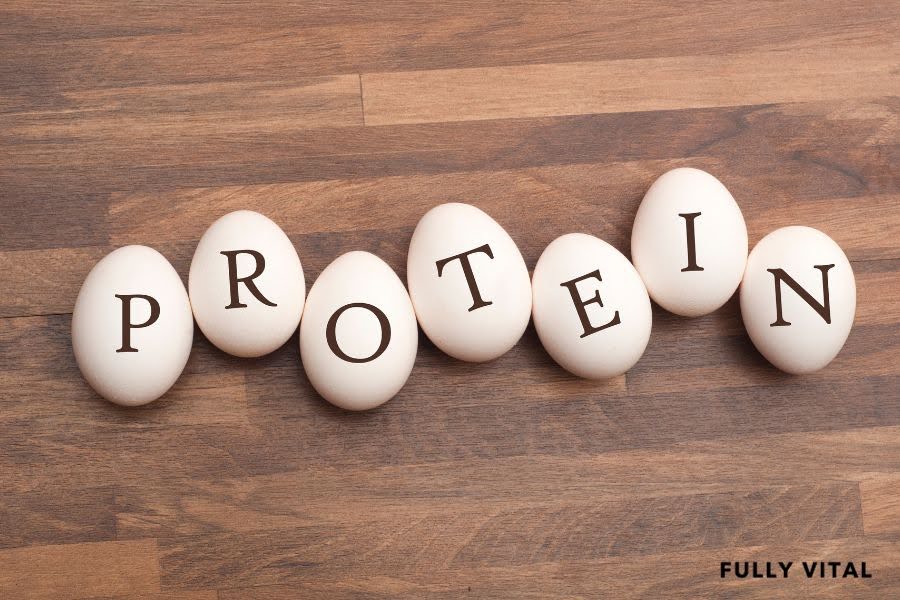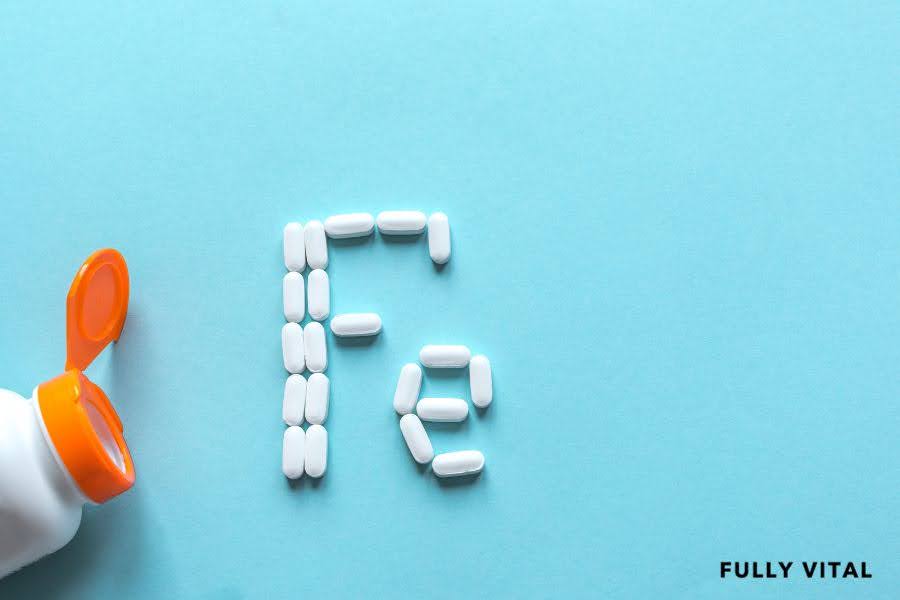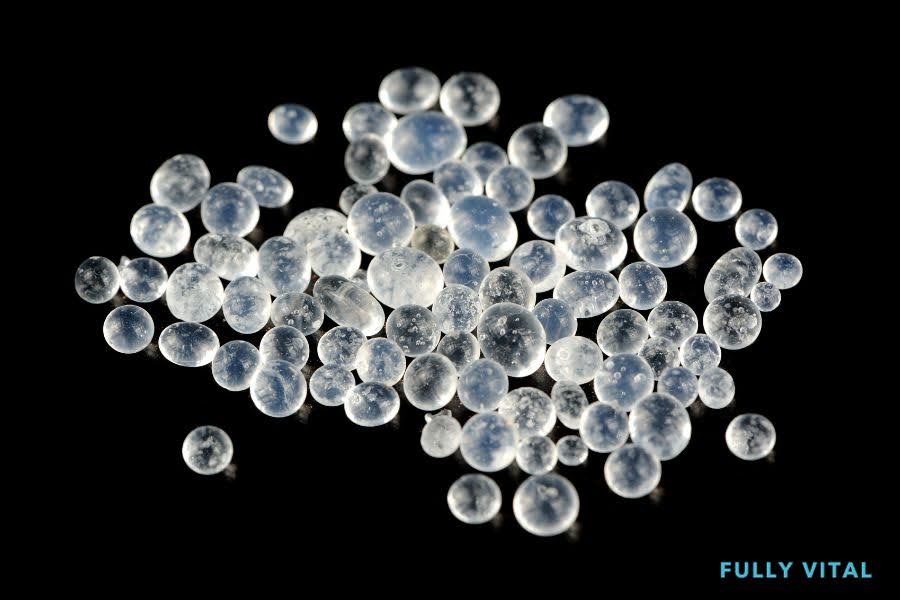
Protein: Building Blocks for Stronger Hair
Protein isn't just a buzzword in nutrition; it’s the building block of every strand on your head.
This macronutrient is vital not only for your overall health but specifically for your crowning glory—your hair.
In this guide, we’re zeroing in on the integral role protein plays in maintaining and nurturing hair.
Healthy hair is more than just a confidence booster; it can be a reflection of your internal health, and understanding protein's contribution is a crucial part of that story.
Our bodies rely on protein to repair cells, produce new ones, and perform essential bodily functions.
For our hair, which is primarily made up of a protein called keratin, maintaining adequate protein is essential.
Think of protein as the lifeline of your hair's health; it's what gives hair its structure and strength.
It's no wonder that protein treatments have become a go-to for those seeking robust and vibrant hair.
Embrace the fusion of nature and science for your hair; our hair growth products are waiting to boost your hair's full potential.

I LOVE MY HAIR NOW
FullyVital hair serum and hair vitamins made tremendous improvements in my hair. I truly love my hair now.
Shop Hair ProductsWhat Is Protein?
Proteins are more than dietary must-haves; they're the workhorses of the cell, performing a vast array of functions.
They are made up of amino acids, often called the building blocks of life, which come together to form long chains.
There are 20 different types of amino acids that can combine to make a protein, each with a unique function in your body.
In the context of hair, the protein known as keratin plays a starring role—it forms the main structure of each hair follicle.
Without keratin and the support from other proteins, your hair would lack the strength and resilience it needs to withstand the daily wear and tear, not to mention the styling heat and environmental stress it endures.
What Is A Protein Treatment For Hair?
Hair is subject to stress every day, which can strip it of its natural proteins.
That's where protein treatments come into play, designed to replenish and reinforce the protein content of your hair.
A protein treatment can patch up damaged areas along the hair shaft, filling in the gaps and strengthening the hair.
The Purpose Of Protein Treatments
Protein treatments are formulated to bind proteins directly to the hair cuticle, providing a strengthening boost particularly for damaged or overly-processed hair.
The primary purpose is to restore the hair's natural strength and elasticity by restoring keratin levels.
How Do Protein Treatments Work?
These treatments typically include protein-derived ingredients, which can temporarily fill in any holes, broken bonds, or weak spots in the follicle.
When applied, the ingredients in these treatments form a protective layer around the hair shaft.
This not only mends the hair but also can protect against future damage.
However, not all protein treatments are created equal, and it's not a one-size-fits-all solution.
They vary in strength and composition, catering to different types of hair damage and textures.
Some treatments are strong and are used in salons, while others are mild enough for regular home use.

Who Benefits From Protein Treatments?
Identifying Candidates For Protein Treatments
While protein treatments are hair lifesavers for some, they're not necessary for everyone.
So, who stands to benefit from this boost? People with damaged, brittle, or over-processed hair are prime candidates.
Hair that suffers from excessive styling, heat damage, or chemical processes, such as coloring, perming, or relaxing, often needs extra protein to rebuild and strengthen its structure.
Hair types that are naturally prone to dryness or have high porosity, meaning they absorb and release moisture quickly, should also look into protein treatments.
These hair types include curly, coily, or kinky textures which naturally have more twists and turns, making them vulnerable to breakage.
When Should You Consider A Protein Treatment?
Recognizing when your hair is thirsty for protein is key.
If your hair has lost its elasticity, becomes tangled easily, or appears limp and lackluster, it might be screaming for a protein pick-me-up.
The tell-tale signs are usually evident after routine hair habits no longer yield the same results, or when increased breakage and split ends become a regular annoyance.
It's also wise to consider a protein treatment after any chemical hair service.
These services can weaken your hair's natural protein structure, so following up with a treatment can help repair and restore its health.
What Is Protein Overload?
Recognizing the Signs of Protein Overload
Protein overload occurs when there is too much protein layered on the hair, causing it to become stiff and prone to breakage.
One of the first signs is a noticeable change in hair texture – if your hair feels unusually hard or straw-like, you might be dealing with protein overload.
Other symptoms include brittle strands that snap easily, a lack of natural shine, and difficulty with styling due to the hair's rigidity.
How to Avoid and Address Protein Overload
Preventing protein overload begins with moderation.
Protein treatments should not be part of your routine if your hair is healthy and you're not subjecting it to damaging styling practices.
When used, they should be spaced apart and alternated with moisturizing treatments to maintain a protein-moisture balance.

Do Protein Treatments Stop Hair Breakage?
Understanding The Effectiveness Of Protein Treatments
Protein treatments can be formidable allies in the fight against hair breakage, but their effectiveness hinges on proper use and application.
When hair lacks sufficient protein, it can become weak and break easily.
A targeted protein treatment can reinforce the hair's natural structure, thereby reducing breakage. However, this isn't a cure-all solution.
Stopping hair breakage usually requires a holistic approach, encompassing diet, hair care practices, and overall health.
Integrating Protein Treatments Into Hair Care Routine
To utilize protein treatments effectively, it's essential to assess your hair's needs and incorporate these treatments into your routine strategically.
For those with visible hair damage and a history of chemical treatments or heat styling, integrating a protein treatment every four to six weeks might be beneficial.
In cases of severe damage, more frequent treatments may be necessary, but always in balance with hydrating care to prevent overload.
It's always recommended to follow product instructions meticulously or to consult a professional stylist, especially for stronger treatments.
At-home remedies should be used with caution, understanding that natural sources of protein, like eggs or yogurt, vary in their protein content and may not offer the same targeted benefits as formulated products.
Discover the Power of Fully Vital Hair Growth ProductsAt Fully Vital, we understand the frustration and concern that comes with the aging of your hair. That's why we have developed a range of hair growth products that are designed to stop and reverse the aging process, giving you healthier, more resilient locks. Here are some key features and benefits of our products:
With Fully Vital, you can take control of your aging hair and achieve the beautiful, vibrant locks you deserve. Experience the power of our hair growth products and unlock your hair's true potential. |
Final Thoughts On Protein
protein stands as a vital element in the tapestry of hair health.
Understanding its role and function opens the door to not only preventing hair damage but also to restoring vitality to distressed tresses.
Protein treatments offer a lifeline to those whose hair has been compromised by environmental factors, heat styling, or chemical processes.
They replenish the protein lost during these harsh treatments, aiding in the hair's recovery and growth.
Step-up your hair game – our specialized hair growth solutions are here to enhance and reinforce your hair’s natural vigor.
Check out our recent blogs:
- Achieve Gorgeous Hair Naturally: Batana Oil's Beauty Secrets
- Best Hair Trends This 2024
- The Waiting Game: When Does Biotin Start Working?
Frequently Asked Questions About Protein
What Exactly Is Protein And Why Is It Important For Hair?
Protein is a macronutrient composed of amino acids that are essential for building and repairing body tissues, including hair.1
Hair is primarily made up of a protein called keratin, which gives it strength and structure.
Adequate protein is crucial for healthy hair growth and maintenance.
How Can You Tell If You Need A Protein Treatment For Your Hair?
You might need a protein treatment if your hair is damaged, brittle, or overly-processed due to styling, heat, or chemical treatments.
Other indications include hair that tangles easily, appears limp, or lacks elasticity.2
What Are Some Common Signs Of Protein Overload In Hair?
Common signs include hair that feels stiff, straw-like, or brittle, reduced shine, and increased breakage.
Hair may also be harder to style and manage due to its rigidity.3
How Often Should You Get A Protein Treatment?
It depends on your hair's condition and needs.
Typically, for damaged hair, a treatment every 4-6 weeks can help, but it's important to maintain a balance with moisturizing treatments.4
Can Protein Treatments Help With Hair Breakage?
Yes, they can help to a certain extent by strengthening and reconstructing the hair.
However, they should be part of a comprehensive approach to hair care that includes a balanced diet and proper hair maintenance.5
Are Protein Treatments Suitable For All Hair Types?
While they can benefit most hair types, they are especially helpful for damaged, high-porosity, or naturally curly, coily, or kinky hair that's prone to dryness and breakage.6
Can You Do A Protein Treatment At Home, Or Should You Go To A Salon?
There are protein treatments available for home use, but it's important to follow the instructions closely.7
For more potent treatments, or if you're unsure of your hair's needs, seek out a professional stylist.
What Ingredients Should You Look For In A Protein Treatment?
Look for treatments containing protein derivatives like keratin, collagen, silk proteins, or plant-based proteins such as soy or wheat.8
How Do You Avoid Protein Overload?
Avoid using protein treatments too frequently and ensure you're also incorporating hydrating products.
It's about finding the right balance of protein and moisture for your hair.9
Should You Change Your Protein Treatment Routine Based On The Seasons Or Environmental Factors?
Your hair's needs can change with the seasons due to differences in humidity and temperature.
Pay attention to your hair's condition and adjust your routine as necessary to maintain balance.10
Sources:
- Healthline. (n.d.). Promising New Hair Loss Treatment Using MicroRNA May Soon … - Healthline. Retrieved from https://www.healthline.com/health-news/microrna-breakthrough-hair-loss-treatment
- PubMed. (2023). Recent Trends in Macromolecule-Based Approaches for Hair Loss Treatment. Retrieved from https://pubmed.ncbi.nlm.nih.gov/37245081/
- WIRED. (2023). This Follicle-Hacking Drug Could One Day Treat Baldness | WIRED. Retrieved from https://www.wired.com/story/new-baldness-treatments/
- Nature. (2023). Studies on the Proteome of Human Hair - Nature. Retrieved from https://www.nature.com/articles/s41598-018-20041-9
- AtlasBars. (n.d.). Proteins in Hair and Nails: Understanding the Protein Constituents of … Retrieved from https://atlasbars.com/blogs/protein-explained/proteins-in-hair-and-nails-understanding-the-protein-constituents-of-hair-and-nail-structures
- LIVESTRONG.COM. (n.d.). Here's What to Know About Protein for Hair Growth - LIVESTRONG.COM. Retrieved from https://www.livestrong.com/article/441073-how-much-protein-to-prevent-hair-loss/
- SkinKraft. (n.d.). Proteins For Hair: Important Food Sources, Supplements, DIY Masks …. Retrieved from https://skinkraft.com/blogs/articles/protein-for-hair
- Allure. (2023). The Top Hair-Care Trends of 2024 Prove We're All Obsessed … - Allure. Retrieved from https://www.allure.com/story/2024-haircare-trends
- Today. (2022). New Study Points to Possible Cure for Hair Loss - TODAY. Retrieved from https://www.today.com/health/new-study-points-possible-cure-baldness-rcna40980
- Nature. (2020). Functional hair follicle regeneration: an updated review. Retrieved from https://www.nature.com/articles/s41392-020-00441-y








